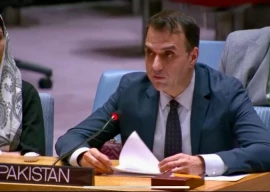
President Asif Ali Zardari fears that the recently passed bill with regard to registration of seminaries may resultif enactedin an increase in sectarianism while also bringing the country once again onto the radar of international watchdogs including the Financial Action Task Force (FATF).
On Friday, President Zardari's reservations with regard to the Societies Registration (Amendment) Bill, 2024 came to the fore. The piece of legislation was introduced in the Senate of Pakistan on October 20 to amend the Societies Registration Act, 1860.
Both houses of parliament passed the bill unanimously. However, President Zardari returned the bill to the National Assembly in late October due to some "technical flaws".
Incensed by this move, the JUI-F, the mover of the bill, announced launching a protest movement against what JUI-F chief Maulana Fazlur Rehman described as a breach of trust.
Raising objections to the bill, the president referred to the existing laws such as the Pakistan Madrasa Education Board Ordinance, 2001 and the Islamabad Capital Territory Trust Act, 2020. He argued that the presence of these laws negates the necessity for new legislation.
According to the president, the Societies Registration Act, 1860 already applies to Islamabad and the proposed amendments do not specify that their implementation would be limited to Islamabad, creating ambiguity.
He noted contradictions in the definitions of madrassas within different clauses of the new bill. The inclusion of madrassa education in the bill conflicts with the preamble of the Societies Registration Act 1860, which does not address madrassas, he stated.
Zardari noted that registering madrassas as societies could lead to their use for purposes beyond education. This raises fears of sectarianism, potential security issues due to the construction of multiple madrassas under one society, and risks of public order disturbances.
The president said there is a possibility of international criticism and adverse reactions from bodies like the FATF, a body which seeks to curb money laundering and terror financing. Approval of the bill might influence Pakistan's ratings and perceptions among global organizations, he added.
National Assembly Speaker Ayaz Sadiq shared the president's detailed objections with the JUI-F's Senator Kamran Murtaza during a meeting at the speaker's chamber.
Later, JUI-F's spokesperson Aslam Ghauri expressed wonder at the president's objections, claiming that Zardari appeared to be acting under "external pressure".
He said the president had raised the objections without following the legal procedure.
He said the objections were raised in installments. Once the objections have been raised and addressed, the president does not have the right to raise further objections.
According to the JUI-F spokesperson, the objections should have been sent to the NA speaker, but this was not done. The speaker's office had received and addressed the initial objections, after which the Presidency did not persist with them, he said.
Ghauri noted that when the president raises objections to a proposed amendment, he is expected to include suggestions or solutions. "In this case, no such constructive recommendations were provided regarding the madrassa bill," he said in a statement.


1734157592-0/Untitled-(1)1734157592-0-405x300.webp)

1718857896-0/Madonna-(1)1718857896-0-165x106.webp)
1733729230-0/jay-z-(1)1733729230-0-165x106.webp)




1734158390-0/Untitled-design-(19)1734158390-0-270x192.webp)
1734156772-0/Copy-of-Untitled-(1)1734156772-0-270x192.webp)







COMMENTS
Comments are moderated and generally will be posted if they are on-topic and not abusive.
For more information, please see our Comments FAQ